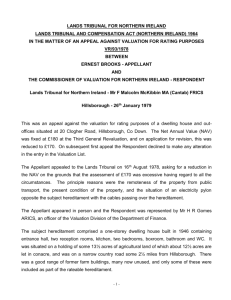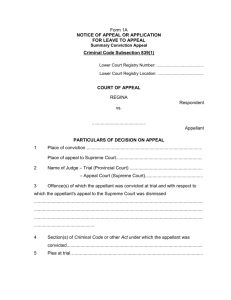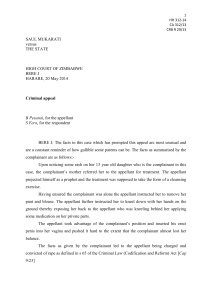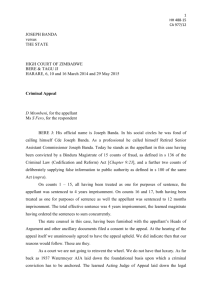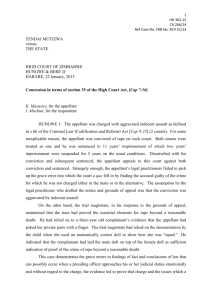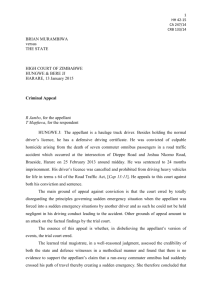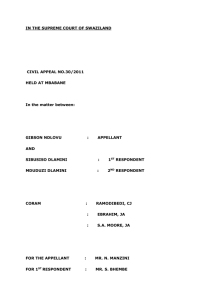LCPSA0110JJULY11 - Lesotho Legal Information Institute
advertisement
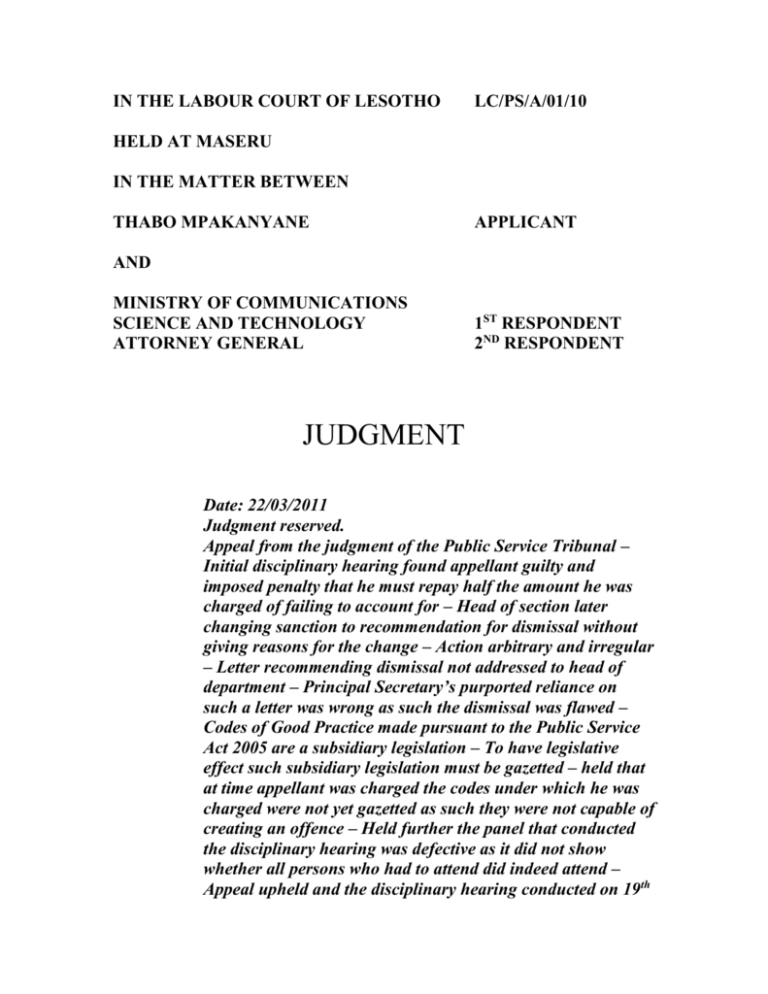
IN THE LABOUR COURT OF LESOTHO LC/PS/A/01/10 HELD AT MASERU IN THE MATTER BETWEEN THABO MPAKANYANE APPLICANT AND MINISTRY OF COMMUNICATIONS SCIENCE AND TECHNOLOGY ATTORNEY GENERAL 1ST RESPONDENT 2ND RESPONDENT JUDGMENT Date: 22/03/2011 Judgment reserved. Appeal from the judgment of the Public Service Tribunal – Initial disciplinary hearing found appellant guilty and imposed penalty that he must repay half the amount he was charged of failing to account for – Head of section later changing sanction to recommendation for dismissal without giving reasons for the change – Action arbitrary and irregular – Letter recommending dismissal not addressed to head of department – Principal Secretary’s purported reliance on such a letter was wrong as such the dismissal was flawed – Codes of Good Practice made pursuant to the Public Service Act 2005 are a subsidiary legislation – To have legislative effect such subsidiary legislation must be gazetted – held that at time appellant was charged the codes under which he was charged were not yet gazetted as such they were not capable of creating an offence – Held further the panel that conducted the disciplinary hearing was defective as it did not show whether all persons who had to attend did indeed attend – Appeal upheld and the disciplinary hearing conducted on 19th 2 January and 3rd February 2010 held to be null and void – Appellant to be reinstated without loss of remuneration seniority or any other benefits due to him. No order as to costs. 1. The appellant herein appeals from the decision of the Public Service Tribunal dated 4th June 2010, which confirmed his dismissal from the Civil Service of the Kingdom of Lesotho. The appellant had initially been charged on the 23rd November 2005 with four charges as follows: (a) Contravening Section 3(1) (f) of the Code of Good Practice of public officers; “in that on or about the 21st July 2005 at or near ThabaTseka post office in the District of Thaba-Tseka, the said officer….failed to account for, make prompt or true return of an amount of M27,740-00 being part of the money for which he was responsible. (b) Contravening Section 3(1)(d) of the Code of Conduct of public officers 2005; “in that during December 2004 to 18th January 2005 at or near Thaba-Tseka in the Thaba-Tseka District, the said officer failed to strive to excel in his endeavours by being an example to others in that being a Senior Postmaster, he failed to account for and make prompt or true return of an amount of M27,740-00, did not do daily balancing, did not record the balance of cash on hand daily and did not endorse his full signature over the money transferred from counter clerk. (c) Contravening Section 3(2)(f) of the Code of Conduct of public officers of the Public Service Act 2005; “in that on or about the 21st July 2005 at or near ThabaTseka post office in the District of Thaba-Tseka, the said officer failed to comply with section 9.1 of the post office manual in that an amount of M27,740-00 was not accounted for promptly or truthfully which money was under his care. 2 3 (d) Contravening Section 3(2)(g) of the Code of Conduct of Public Officers of the Public Service Act 2005; “in that on or about the 21st July 2005 at or near ThabaTseka post office in the District of Thaba-Tseka, the said officer did knowingly make false, misleading or inaccurate statement in official document or book in that he entered fictitious figures in the cash book.” 2. The disciplinary hearing was scheduled to take place on the 8th December 2005. There is no record of what transpired on that day. However, what purports to be the judgment of that hearing says the hearing was held on the 19th January and 3rd February 2006. The judgment was that the appellant was found guilty on count 1, absolved on counts 2 and 4, while count 3 was withdrawn. It follows that the appellant was found guilty of contravening section 3(1) (f) of the Code of Conduct of Public Officers in that he failed to account for M27,740-00. 3. In advance of dealing with the appellant’s grounds of appeal it is apposite to review the relevant sections of the legislation which regulate the conduct of disciplinary proceedings against civil servants. The principal law is the Public Service Act No.1 of 2005 (the Act), which came into force on the 1st April 2005 per legal notice No.31 of 2005. Section 15(1)(a)(i) thereof, empowers the Minister after consultation with persons or bodies which in his/her opinion represents the interests concerned to: “(a) prepare and issue codes of practice for the purposes of providing practical guidance in respect of this Act including the following codes: “(i) Code of conduct….. “(ii) Grievance code…. “(iii) Disciplinary code….. “(iv) Code on collective bargaining…. “(v) Code on dispute resolution…. “(vi) Code on retrenchment….” In terms of subsection (2) the codes so made are to be laid before parliament which may disallow them or allow them as the case may be with or without modifications. 3 4 4. The Minister duly prepared and issued the codes and presented them before parliament which passed them without amendments on the 28th June 2005. Section 3 of the codes prescribes the dos and don’ts of public officers. Section 15(6) of the Act provides that contravention of “any provision contained in the code of conduct issued under this section shall constitute a misconduct rendering the public officer to proceedings and sanctions as set out in the code of conduct.” (emphasis added). 5. Part III of the codes provide a disciplinary code. It details a disciplinary procedure set out in 4 stages as follows; verbal warning, written warning, disciplinary inquiry and lastly appeal hearing. Appellant’s misconduct was classified under stage 3 – disciplinary inquiry. Section 8 provides the procedure for dealing with a disciplinary enquiry. 6. Sub-section (1) states that it is a supervisor who shall arrange the inquiry and give the officer adequate notice of at least 48 hours or two working days before the inquiry is held. Subsection (2) provides for persons who must attend the inquiry. They are the following: (a) Head of section; who shall be the chairperson. (b) The public officer’s immediate supervisor. (c) The public officer (defendant). (d) Representative of Human Resources who shall be secretary and advisor on policy issues. (e) The public officer’s representative. (f) Witnesses if any. 7. In terms of subsection (5) the chairperson of the inquiry is empowered to decide on an appropriate penalty, short of dismissal. If the head of section contemplates dismissal of a public officer to be an appropriate penalty, he shall recommend such dismissal to the head of department. (Principal Secretary). 4 5 8. Reverting now to the case at hand, it is common cause that following conviction the chairperson decided that appellant be surcharged an amount of M17,480-00. I use the word chairperson presumptuously, because, the so-called judgment is neither signed nor does it show who the chairperson was and whether he was indeed head of section. The only persons it shows to have been in attendance are the appellant and his immediate supervisor. There is no indication that the representative of the Human Resources Department for whom it was mandatory to be in attendance in order to record the proceedings, was present. There is no evidence that the proceedings were recorded either. What then do we make of this hearing? More of this later. 9. On a date that is not particularized in what is termed “judgment on the Disciplinary Hearing of Thabo Mpakanyane (Senior Postmaster) Thaba-Tseka post office;” the nameless person whom we presume to be the head of department, pronounced a judgment in which he or she found appellant guilty on count 1. He stated that evidence failed to prove on a balance of probabilities that appellant was guilty in counts 2 and 4. He however, said there was overwhelming evidence against appellant in count 1. 10. Since there is no record of the proceedings, it was impossible for the appeal tribunal, as well as this court, to confirm that the evidence was overwhelming in count 1 and inadequate in counts 2 and 4 as alleged. In the course of his/her judgment the author of the judgment had occasion to observe that: “It was discovered that other witnesses connived with the complainant to frame the defendant and that was not acceptable.” The presiding officer returned a verdict of guilty in count 1 nonetheless, and ordered that the appellant be surcharged the amount of M17,480-00 being part of the M27,740-00 he was initially charged with. 5 6 11. On the 21st February 2006, Mr. Lebakae who was 1st respondent’s Director of Administration, wrote appellant a letter informing him that following the disciplinary enquiry he (Mr. Lebakae) had found appellant guilty as charged in count 1. He further informed him that “it is therefore recommended that you be dismissed from the civil service.” The letter purported to “attach ….. a full judgment for your perusal.” 12. This is the first time that it becomes apparent that Mr. Lebakae was appellant’s head of section and as such the chairperson of the disciplinary enquiry. The only judgment this court has seen and which has not been disputed by Mr. Molokoane for the respondents is the unsigned judgment which pronounced a penalty of surcharge. Clearly Mr. Lebakae’s letter of 21st February 2006 sought to contradict the judgment already given and gave no reasons for doing so. That was clearly an arbitrary and therefore irregular act. 13. On the 12th June 2006, the Principal Secretary wrote appellant a letter in the following terms: “I have examined facts of the case and recommendations of the chairperson of the panel and concur with the recommendation that you be dismissed from the civil service in accordance with section 8(6) of the codes of discipline.” Mr. Lebakae’s letter of 21st February was not addressed to the Principal Secretary but to the appellant. Neither was it copied to him. This is apart from the fact that it was plainly irregular for being in contradiction of the judgment which had prescribed surcharge as penalty. The Principal Secretary could not therefore purport to make his decision on the basis of that letter. If that was the case it was absolutely wrong because the letter having not been addressed to him, it was not made in terms of section 8(6) of the codes of discipline. Clearly therefore the Principal Secretary decision of 12th June 2006 was flawed, if it was based on Mr. Lebakae’s letter of 21st February 2006. 6 7 14. It was suggested that appellant did not even receive the Principal Secretary’s letter and that the appeal he lodged was against the letter of Mr. Lebakae. This may or may not be so, but this court will not get into it as there is no evidence other than appellant counsel’s submission, to substantiate when appellant received the Principal Secretary’s letter. However, appellant noted an appeal on the 15th March 2010. He also prayed for the condonation of his late noting of appeal saying the delay was caused by the fact that the Public Service Tribunal; the body to which he had to appeal was not yet established. His appeal was duly entertained. 15. Appellant’s grounds of appeal were contained in his appeal form and amplified in an annexure attached thereto. The grounds in so far as they are relevant to these proceedings were that: (i) (ii) (iii) (iv) The chairperson erred in finding appellant guilty as charged regard being had to the chairperson’s finding that there was conspiracy to frame the appellant. The sentence of dismissal is invalid to the extent that it is inconsistent with the penalty imposed by virtue of the judgment. The Principal Secretary had no jurisdiction to decide appellant’s liability and subsequent imposition of penalty of dismissal in as much as the cause of action arose under the repealed public service Act No.13 of 1995. Section 3(1)(f) of the Codes of Good Practice 2005, under which appellant was charged do not create a disciplinary offence in as much as: (a) They are neither subsidiary nor subordinate legislation contemplated by the act. (b) They have not been laid before parliament and passed by parliament as required by law for them to be subordinate or subsidiary legislation. (c) They are not gazetted. 7 8 16. It is common cause that the Tribunal overturned appellant’s appeal and confirmed the finding of the disciplinary panel as well as to uphold the Principal Secretary’s decision to dismiss. Appellant has further appealed to this court pursuant to section 4(5)(d) of the Public Service (Amendment) Act 2007, which permits “a party who is dissatisfied with a decision of a (Tribunal to) appeal to the Labour Court.” The grounds of appeal are essentially the same as those argued before the Public Service Tribunal with slight modifications. 17. It was contended that the Principal Secretary and by necessary implication the disciplinary tribunal had no jurisdiction to deal with appellant’s infraction in terms of the Public Service Act 2005, because the cause of complaint against appellant arose under the regime of the repealed Public service Act 1995. The chairperson of the Tribunal agreed that the contention would hold if indeed the cause of action arose under the regime of the repealed Act. He however, came to the conclusion that the argument fell to be dismissed because the cause of action arose after the repeal of the 1995 Act. 18. This may well be so, but even if the cause of action had arisen prior to the promulgation of the 2005 Act, as long as the misconduct came to be prosecuted after the enactment of the new act, it would have to be dealt with in terms of the new act. We find good company in the view that we hold in the decision of the Court of Appeal of Lesotho in Attorney General & 2 Others .v. S. Kao C of A (civ) No.26 of 2002, especially from the passage quoted with approval from the case of Curtis .v. Johannesburg Municipality 1906 TS303 where the following was said: “Every law regulating procedure must in the absence of express provisions to the contrary, necessarily govern so far as is applicable, the procedure in every suit which goes to trial after its promulgation. Its prospective operation would not be complete if this were not so, and it must regulate such procedure even though the cause of action arose before the date of the promulgation and even though the suit may have then been pending.” 8 9 19. Ramolibedi J. as he then was ruled in the Kao case that the provisions governing the forum/court that should hear applicant’s dispute were procedural and accordingly remitted applicant’s case to be dealt with in the Labour Court even though the amendment extending the jurisdiction of the Labour Court was not in place at the time the applicant’s cause of action arose. The present case fits hand in glove in the aforegoing ruling, in as much as the appellant’s cause of complain is primarily the forum that ought to hear his disciplinary case. Accordingly, there is no merit in the challenge to the jurisdiction of the Principal Secretary to adjudge appellant’s case. 20. Appellant challenged the validity of the charge based on section 3(1)(f) of the Codes of Good Practice on three grounds namely; (a) The codes are not subordinate legislation as contemplated by the Act. (b) The codes have not been laid before Parliament as required by the law to make them subordinate legislation. (c) The codes have not been gazetted. The first two grounds on which the codes are challenged are interrelated as such they deserve to be dealt with together. The codes are published in Legal Notice No.194 of 2008, dated 11th December 2008. Prior to dealing with the codes themselves the Legal Notice has a preliminary note for general information that says that; “It is notified for general information that the Codes of Good Practice 2005 were: (a) Pursuant to section 15(1)(a) of (the Act) prepared and issued by the Honourable Minister responsible for the Public Service; (b) Pursuant to section 15(2) passed by the National Assembly without amendments on the 8th June 2005 and by the Senate without amendments on the 24th day of June 2005 and 9 10 (c) Pursuant to section 15(5) were circulated under the Ministry of Public Service Circular Notice No.13 of 2005 on the 15th August 2005. 21. Save for sub-paragraph (c), sub-paragraphs (a) and (b) of the notice directly answer appellant’s concern that the codes were not laid before Parliament as such they lack the status of subsidiary legislation. They clearly were presented to both houses of Parliament and were duly passed. Appellant has never disputed the truthfulness of the contents of the note and we have no reason to disbelieve the Minister’s averrements to that effect. (see sec. 30(b) of Interpretation Act). 22. There is not the slightest doubt that pursuant to the law vide the Interpretation Act No.19 of 1977, the Codes of Good Practice are subsidiary legislation by virtue of: (i) (ii) (iii) Having been made by the Minister in exercise of the powers vested by an act of Parliament vide Act No.1 of 2005. (see definition of subsidiary legislation in the Interpretation Act). Having been passed by the two houses of Parliament (see Sec. 3(1)(c) of the Interpretation Act). The fact that they have a legislative effect. (see Sec. 15(6) of the Act read with the definition of “subsidiary legislation” in Interpretation Act.). Clearly therefore, appellant’s first two concerns with Section 3(1)(f) of the Codes of Good Practice have been satisfied. 23. We come now to the complaint that the codes were not gazetted. This seems to be common cause, regard being had to the date appellant was charged under the codes (23/11/05) and the date of gazettment of the codes viz. 11/12/2008. According to the preliminary note in the Legal Notice, in August 2005 the codes were circulated in a ministerial circular notice. That is not the same as publishing them in the gazette, in as much as a gazette means: 10 11 “(a) “(b) The Lesotho Government Gazette and any supplement thereto; any special gazette or Extra-Ordinary Gazette.” (see Interpretation Act 1977). 24. It is the requirement of the law vide Sec.16(a) read with sec. 3(1)(c) of the Interpretation Act that every act, including subsidiary legislation (see definition) be published in the gazette. Appellant is correct that at the time that he was charged under clause 3(1)(f) of the codes they (the codes) were not gazetted . They therefore had not completed the circle to make them subsidiary legislation “….having legislative effect.” 25. In his submissions Mr. Setlojoane contended that this means that the codes did not exist and the appellant was charged under non existent law. Exist they did, but not in law. As such they were not yet capable of creating an offence, the commission of which would result in disciplinary action pursuant to section 15(6) of the act. They were at that time akin to a bill which, although it has been passed by Parliament has not yet been published in a gazette. They only became complete subsidiary legislation under which appellant and indeed all other civil servants could be charged, upon publication in the gazette. It follows that appellant’s appeal on this point ought to be upheld. 26. Appellant’s success on this point alone is a fatal blow to the entire disciplinary proceedings and the purported dismissal arising out thereof. However, the defect of the proceedings against appellant do not end here. From the papers filed of record it is clear that the panel that conducted appellant’s disciplinary proceedings was wholly defective in that it does not show who chaired it. According to the law the head of section had to chair, but the judgment does not say who was the chairperson. 11 12 27. As if that was not enough, whomever wrote the judgment has not authenticated it with his/her signature. To add insult to injury, yet another communication which was inconsistent with the judgment that appellant be surcharged, emanated from the Director of Administration, who for the first time held himself out as the decision maker. He however proffered no explanation why the contents of the letter differed from the judgment. 28. In their judgment the appeal tribunal held the unsigned judgment that imposed the penalty of a surcharge to be a no judgment. They concluded that the proper judgment to follow was the letter of Mr. Lebakae of 21st February 2006. That is wrong. The Tribunal cannot in the absence of evidence arbitrarily pick and choose what to believe and what not to believe. The correct approach is to treat both the judgment and the letter together as representing conflicting judgments in appellant’s case, resulting in a confusion which cannot be relied upon to appellant’s detriment. Why should that be when appellant is not the author of the impasse? 29. There was therefore merit in the appellant’s contention that the letter of recommendation for his dismissal contradicted the earlier finding that he was to be surcharged. If at all the finding, which was short of dismissal had to be changed, it certainly could not be changed without appellant’s knowledge. Accordingly, even if Mr. Lebakae was the author of the unsigned judgment, he could not unilaterally change it and recommend a harsher penalty. He was bound to follow due process and consult with the full panel as well as the appellant. 30. We could go on and on, but the findings thus far which are in favour of the appellant, suffice for the appeal to be upheld and for the decision of the appeal tribunal to be substituted with the finding that the whole disciplinary proceedings against the appellant are null and void. Accordingly, the dismissal of the appellant on the 12th June 2006 is set aside as irregular step, which was not carried out in accordance with the law namely, due disciplinary process. Accordingly, the appellant is to be reinstated in his job from the date of his purported dismissal 12 13 without loss of remuneration, seniority or other benefits to which he would have been entitled had he not been dismissed. There is no order as to costs. THUS DONE AT MASERU THIS 30TH DAY OF JUNE, 2011. L. A. LETHOBANE PRESIDENT L. MATELA MEMBER I CONCUR D. TWALA MEMBER I CONCUR FOR APPLICANT: FOR RESPONDENTS: ADV. SETLOJOANE ADV. MOLOKOANE 13


